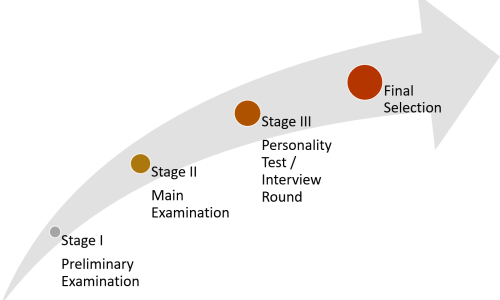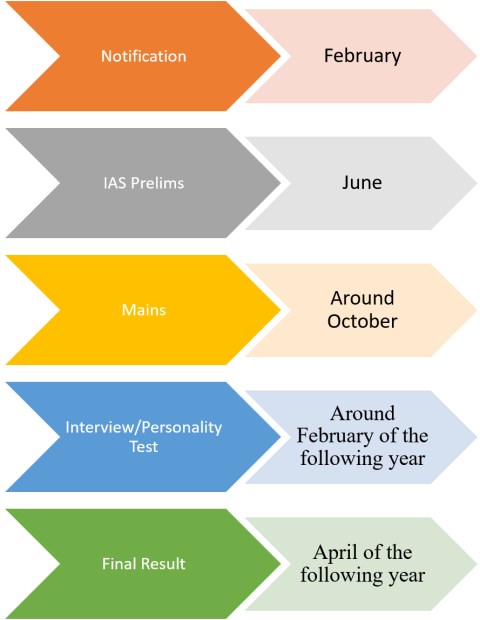
- Call : 8789245158
- Mail : info@kavishias.in
- Centres : Hazra Road & VIP Road Kolkata
ABOUT UPSC
1. Stages Of Exam
The Civil Services Examination (better understood as IAS Exam) is conducted by the Union Public Service Commission (UPSC) annually. The Exam consists of 3 stages:
- Stage I: Preliminary Examination
- Stage II: Main Examination
- Stage III: Personality Test/Interview Round

- Stage I: Preliminary Examination
- Stage II: Main Examination
- Stage III: Personality Test/Interview Round
The stage 1 of the civil services exam is Prelims, which is a screening test for candidates and comprises of two papers with questions of objective or MCQ type
- Paper-1 (General Studies) is evaluated for merit ranking while
- Paper-2 (CSAT) is of qualifying nature.
A. Paper-1: UPSC SYLLABUS: (200 MARKS) DURATION: TWO HOURS (COUNTED FOR THE MERIT RANK IN THE PRELIMS)
- Current events of national and international importance.
- History of India and Indian National Movement.
- Indian and World Geography – Physical, Social, Economic Geography of India and the World.
- Indian Polity and Governance – Constitution, Political System, Panchayati Raj, Public Policy, Rights Issues, etc.
- Economic and Social Development Sustainable Development, Poverty, Inclusion, Demographics, Social Sector initiatives, etc.
- General issues on Environmental Ecology, Bio-diversity and Climate Change – that do not require subject specialization.
- General Science.
B. Paper-2: UPSC SYLLABUS: (200 MARKS) DURATION: TWO HOURS (NOT COUNTED FOR THE MERIT RANK IN PRELIMS BUT A QUALIFYING PAPER; JUST NEEDS 33% MARKS)
- Interpersonal skills including communication skills.
- Logical reasoning and analytical ability.
- Decision-making and problem-solving.
- General mental ability.
- Basic numeracy (numbers and their relations, orders of magnitude, etc.) (Class X level), Data interpretation (charts, graphs, tables, data sufficiency etc. – Class X level).
The stage 2 of the Civil Services Exam is called the Mains Exam, which is a written descriptive examination and comprises of 9 papers. The 9 papers are as follows:
- Paper-A (Compulsory Indian Language);
- Paper –B (English) which are qualifying in nature, while the other papers like Essay, General Studies Papers I, II, III, and IV, and Optional Papers I and II are considered for the final ranking.
QUALIFYING PAPERS – NOT COUNTED FOR FINAL RANKING:
- Paper ‐A – Indian Language . (One of the Indian Languages to be selected by the candidate from the Languages included in the Eighth Schedule to the Constitution. This paper will not be compulsory for candidates hailing from the States of Arunachal Pradesh, Manipur, Meghalaya, Mizoram, Nagaland and Sikkim.)- 300 Marks.
- Paper‐B – English Language -300 Marks.
PAPERS TO BE COUNTED FOR MERIT RANKING:
- Essay – 250 Marks.
- General Studies – I – 250Marks. (Indian Heritage and Culture, History and Geography of the World and Society).
- General Studies –II – 250 Marks. (Governance, Constitution, Polity, Social Justice and International relations).
- General Studies –III – 250 Marks. (Technology, Economic Development, Bio‐diversity, Environment, Security and Disaster Management).
- General Studies –IV – 250 Marks. (Ethics, Integrity and Aptitude).
- Optional Subject – Paper 1 – 250 Marks.
- Optional Subject – Paper 2 – 250 Marks.
Candidates who clear the Civil Services Mains Exam with the required cutoff marks will qualify for the final stage of the exam i.e., the Personality Test or Interview round with the UPSC Board Members. Marks, thus obtained by the candidates in the Mains Examination as well as the marks obtained in Interview would determine their final ranking. The object of the interview is to assess the personal suitability of the candidate for a career in Public Service by a Board of competent and unbiased observers. The test is intended to judge the mental calibre of a candidate.
2. The Timeline Of Events For The Civil Services Examination (CSE).

CONTACT DETAILS
- info@kavishias.in
- +91 8789245158
- First Floor CL Bhawan, 56/2 Hazra Road, Dover Terrace, Ballygunge, Kolkata-700019, West Bengal
- Office No. 2B, 2nd. Floor, Ved Bhoomi, Koyla Vihar Vasundhara, VIP Rd, Tegharia, Kolkata, West Bengal 700052
Kavish IAS
- Best UPSC Coaching In Kolkata
- Best WBCS Coaching In Kolkata
- Best JUDICIARY Coaching In Kolkata
- Best BANKING & SSC Coaching In Kolkata
Quick Links
- Home
- Courses
- Daily News Zone
- About Us
- Enquiry Form



